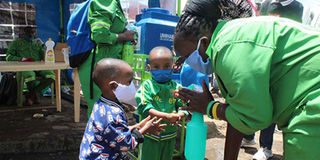Why we should talk to children about Covid-19

A UN Habitat staff demonstrates appropriate hand washing techniques to children in Makina, Kibra, on April 8, 2020. PHOTO | COURTESY
What you need to know:
- Remind your children that they are not likely to catch the disease if they follow these hygiene and distancing practices.
- Children will pick up on your own mental state, so it helps them to know you’re calm and in control.
It is now slightly more than a month since the first case of Covid-19 was detected.
Many adults are feeling anxious, confused, worried and/or overwhelmed by the speed and reach of the events. The same is true of children, and it is our responsibility to address their fears and worries.
As a parent, I know how hard it can be to talk about difficult issues like this with children.
Although it can be challenging, it’s important that parents talk to their children’s they might find it difficult to understand what they see on TV, hear on the radio and/or from their friends.
So what can parents do? First, familiarise yourself with the correct information. The Ministry of Health, the World Health Organisation and Unicef are all great sources of online information.
If you don’t have internet access, listen to the official government messages on the radio. Next, invite your child to talk about the issue.
SAFE PRACTICES
Use “open-ended” questions. Find out how much they already know. If they’re very young and haven’t already heard about the outbreak, you may just remind them about good hygiene practices.
Make sure you are in a safe environment and allow your child to talk freely. Drawing, stories and other playful activities may help them to open up.
Be sure to acknowledge their feelings and assure them that it’s natural to feel scared and/or worried about these things. Be honest and explain the truth in a simple manner that children can relate to.
Show your children how to protect themselves and their friends. One of the best ways to keep safe from Covid-19 is to encourage regular handwashing with soap.
If soap and water are not available, the right alcogels can be used. Show them how to cover their cough or sneeze with their elbow.
If there is an outbreak in your area, remind your children that they are not likely to catch the disease if they follow these hygiene and distancing practices.
Explain that many people who have Covid-19 do not get very sick.
BE IN CONTROL
Check if your children are either experiencing or spreading stigma. Explain that Covid-19 has nothing to do with what someone looks like, where they are from or what language they speak.
Remind them that bullying is always wrong. You can help your children cope by finding opportunities for them to play and relax. Keep regular routines and schedules as much as possible.
Lastly, take care of yourself. You’ll be able to help your children better if you’re coping well too. Children will pick up on your own mental state, so it helps them to know you’re calm and in control.
If you’re feeling anxious, reach out to family, friends or people you trust in your community.
Unicef is supporting the government as part of the UN’s Covid-19 response in Kenya. We’re providing portable handwashing stations, knapsack disinfectant sprayers, thousands of bars of soap and surgical masks.
And we’re providing important information for parents on the free online platform Internet of Good Things: ke.goodinternet.org.
The writer is the Unicef Kenya representative; Twitter: @maniza_zaman




